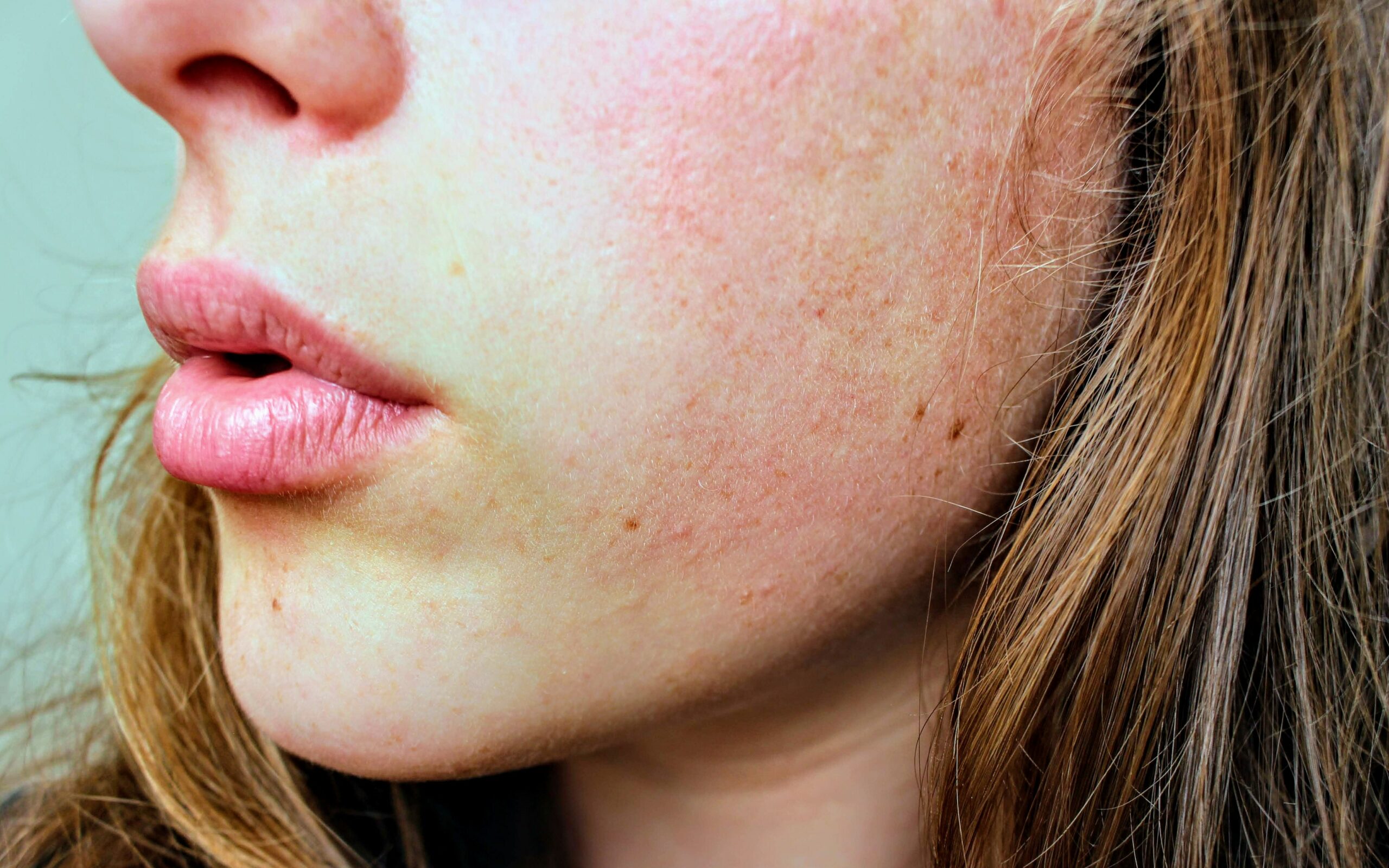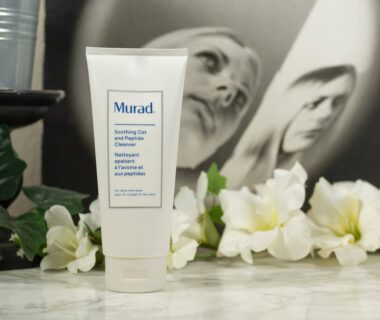ADVERTISEMENT INFO: SOME PRODUCTS MENTIONED AT THE END OF THIS POST ARE PR (GIFTED) AND LINKS USED ARE AFFILIATE LINKS. I RECEIVED NO MONEY TO WRITE THE BLOGPOST. PLEASE READ DISCLAIMER
Do you suffer from flaky skin on your face or body and want to know why? Or do you simply know that once the cold sets in, your face will start to peel, even though you moisturize?

No matter if flaky, peeling skin is a regular, seasonal or a first time thing for you, after reading this post you should know what flaky skin actually is, how you can avoid it and what you should absolutely not do when it happens. And the best way to treat it obviously, both in the form of general tips as well as skincare products that might help.
So without further ado, let’s talk.
What is flaky, peeling skin?
To understand what flaky skin actually is, you need to remember that the part of the skin we are seeing is only the upper part called epidermis, made up of already dead skin cells that are linked together by a lipid layer mainly made up of ceramides, cholesterol and free fatty acids between them. On top of that the sebum, produced in the sebaceous glands, spreads, sealing the top layer of cells off against the environment.
So at the base layer new cells are formed that travel up, lose their nucleus and once they reach the skin’s surface ideally shed in a controlled process called desquamation.
If that desquamation process doesn’t happen as it should, because your skin is lacking sebum or epidermal lipids for example, the result might be visible flaking or peeling, often alongside itching.

What are the main causes for flaky, peeling skin?
The reasons for that are manyfold and range from genetics to external factors, some of which can be easily treated while others need medical guidance.
To the ones you usually can’t treat alone at home belong skin conditions like psoriasis, atopic eczema, seborrheic dermatitis or rosacea as well as skin manifestations of general diseases like diabetes or hypothyroidism. (More info: Do’s and Dont’s for rosacea skin and Damaged skin barrier as cause of acne and atopic dermatitis?)
Sometimes flaky skin also occurs as a side effect of certain drugs used to treat high blood pressure, seizures or as side effect of acne medication, and obviously that as well needs talking to your doctor. It is not a good idea to alter your seizure tablets based on the fact you read on a blog that this might improve skin flaking…
Another reason for flaky skin is as part of a generalized infection or a skin infection with fungi, staphylococci or streptococci. This often presents with strong itching and yellow secretion out of the affected areas.
More common than the ones above are lifestyle factors that range from the weather, with cold and dry air as well as wind reducing your skin’s natural lipids to the products you are using and the frequency you use them with: Certain products can be stripping – and I say products, not ingredients, on purpose, the overall formulation is much more important than the individual ingredient, no matter how harsh it might be when used on its own. Often cleansers are the culprit, especially those designed for oily skin, as they aim to remove excess sebum and other skin lipids which in turn can lead to a lack of these lipids if your skin isn’t as oily as you assumed, or if your skin’s lipid levels are reduced by hormonal changes, the weather or the aging process.
Yes, age, once again a contributing factor to skin changes, this time it being more prone to flaking due to reduced lipid levels through reduced production.
A special form of product induced flaky skin is perioral dermatitis, where the skin around your mouth – perioral – and often nose is irritated and red and that was, back when I was in university, called flight attendants disease as legend had it that female flight attendants often used a variety of different cosmetic products, much more than the average consumer. That was obviously before the days of the YouTube influencers with their 10 step routines. I think perioral dermatitis deserves a post of its own though, so for now let’s move on.
The last causes I want to mention are physical damage done to the skin through UV radiation, heat or chafing – all of these lead to flaky skin during the healing process – and nutritional deficiencies like Vitamin D or Niacin deficiency. (More info: Warning signs of Vitamin D deficiency)
Does flaky skin mean the skin is healing?
A common misconception is that because the skin reacts to a problem with flaking, that means that the flaking is a sign of the skin healing. It is not.
The healing process takes part in the deeper layers of the skin, not right at the surface, and is not quicker or better because of the flakes on top. Still, you should absolutely not rip the flakes off if they are big enough to grab – they do provide protection to the new skin forming underneath, and ripping them off could create a wound that increases the risk for infection.
How can you avoid flaky skin?
Now when you look at the causes we mentioned earlier, you will realize that flaky skin can’t always be avoided – you can’t change your genetic disposition for example. What you can do though is avoid things that aggravate the situation, and that is everything that will weaken your skin barrier or lipid layer.
Use gentle cleansing products that respect the skin’s pH, don’t wash too frequently, don’t overdo it on the actives and add lipids back in your skin with your moisturizer. (More info: Do you need to Double Cleanse?)
When you react to dry air, try using a humidifier and protect your skin with a scarf or similar when you go outdoors in the cold.
Don’t smoke, don’t get too much UV light and avoid water that is really hot – it isn’t rocket science, but often needs some effort to overcome old habits.
(More info: How to protect your skin in winter)
How can you treat flaky, peeling skin?
If your skin is already flaky, there are a few skincare things you can do in addition to the preventative ones mentioned above to try and treat that, and the most important is your moisturizer. If it isn’t part of an infection, it usually means your skin is lacking lipids, and these can be applied topically.
Put very simply: The thicker the cream, the better the results, but as we are well versed in skincare, let’s look at the different components of your average moisturizer.
There are humectants, meant to draw water in the skin, which are good at hydrating, but probably won’t have much of an effect on flaky skin without occlusives. Well known humectants are Hyaluronic Acid, Glycerin, Urea or the so called Natural Moisturizing Factors (NMF). (More info: Everything you need to know about humectants and Hyaluronic Acid in skincare – More than a humectant?)
Then there are emollients, which aim to fill the space between the skin cells, so basically go where lipids are missing, and occlusives that form a film on top of the skin rather than going between the cells. (More info: The difference between emollients and occlusives) Both are amazing in improving the appearance of flaky skin, and depending on the actual ingredient often have emollient and occlusive properties, so this isn’t a strict either or.
Usually things like Petrolatum or beeswax are considered occlusives, while other lipids like Linoleic Acid or ceramides are considered emollients.
Depending on the reason for your flaky skin, you usually need a mixture of both, but weighed differently: If your skin is flaky because you are outside in the snow a lot, more occlusives might work better for you. If you overdid the actives, more emollients might help speedup recovery. As I mentioned in my video on ceramides though, we do, outside of very specific skin conditions, no evidence that a certain kind or a certain ratio of skin-like lipids are better than others. Most moisturizers do feature humectants, emollients and occlusives in a mix anyway, so they should work fine.
Why is your skin still flaky even though you moisturize?
Now sometimes you do use a moisturizer religiously, but your skin still is flaky. In that case I would take the following steps to improve the situation:
- Look at the rest of your routine: Moisturizer alone will probably not be enough to counteract frequent washing with a strippping cleanser or using high amounts of actives
- Look at your moisturizer: Names are deceiving, and sometimes a product called serum is richer than the one called face cream. In doubt, opt for something that feels richer or mix a few drops of oil with your product before application.
- If all that won’t help, consider the other causes I mentioned before and in doubt consult a doctor to rule out an underlying skin condition or systemic disease.
Are there foods and drinks that help avoid flaky skin?
As always I want to shortly address the food and supplement question alongside the usual disclaimer that I am not a nutritionist. While malnutrition can be the cause for flaky skin, it is rare in otherwise healthy individuals eating a balanced diet. If you suffer from malabsorption due to a gastric condition or suffer from alcoholism or another substance abuse, I would suggest talking to your healthcare provider, but otherwise I don’t think you need a supplement or a specific diet. (More info: The best foods and supplements for your skin)
When do you need to see a doctor?
So when is flaky skin a reason to see a doctor? Well, if it really bothers you and you feel that despite taking preventative measures and using a rich moisturizer things don’t improve, you should go get a professional opinion to rule out underlying issues that need treatment.
Warning signs also include itching or pain associated with the flaky skin, large areas of face and body that are affected, foul odor or yellowish liquid oozing out of the areas, cracking and bleeding and signs of general infection like nausea, dizziness or confusion. If you experience any of these symptoms, talking to your healthcare provider is recommended.

Products that might help
Don’t forget to check out the Discount Code Page on top if you want to save some money on your next skincare purchase.
If you want to get a vote in the next Ask Doctor Anne Topic, Ingredient Spotlight or product I review, don’t forget you can head over to my Patreon account to get more involved!


